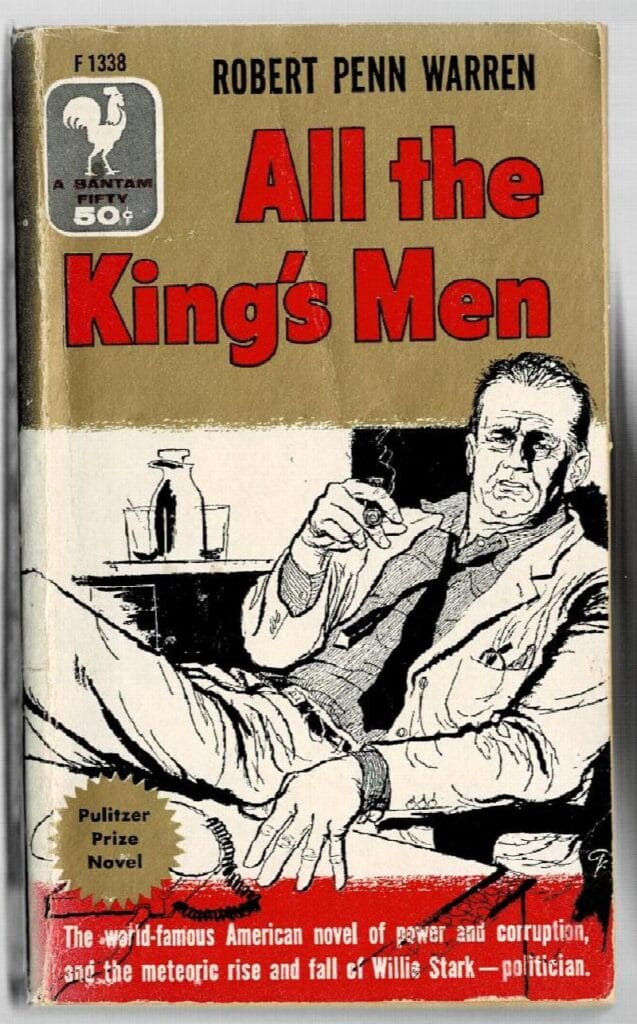Robert Penn Warren as political Cassandra in ‘All the King’s Men’

Some years ago, I approached the junior members of a think tank to which I contributed blog posts and essays on literature and other cultural matters for a proposed celebration of the anniversary of the publication of Harper Lee’s “To Kill a Mockingbird.” Not one person accepted the assignment, which, to me, was unthinkable. Further, not one person thought it advisable to download a copy and read it.
I’m not talking about know-nothings and illiterate knuckle-draggers, either. This was a group of highly intelligent and amazingly educated people. Still, I couldn’t disguise my disappointment with this particular group of truly accomplished scholars for missing out on such a seminal piece of fiction (as well as the Gregory Peck film it inspired) that had a tremendous impact on the racial views of our culture – and my own personal growth.
Likewise, Robert Penn Warren’s “All the King’s Men,” the 1946 Pulitzer Prize-winning novel. One might say the populism depicted in the novel might have derived from a similar uninformed disinterest in the culture that I witnessed in my attempt to commemorate “Mockingbird.” For those tempted to dig into Warren’s fiction masterpiece (his poetry is stellar as well), fair warning: the “n” word abounds.
Those who celebrated Willie Talos’ (Willie Stark in the movies) demagoguery in the novel and the political figure with whom he is most associated, Huey Long, the former Louisiana governor and senator, are likely also uninformed of literature’s catalog of human foibles it’s advisable to avoid.
Had the Rubes who brought Talos and Long to power and kept them there known their George Santayana and Lord Acton, they might not have repeated history and bestowed the corrupting force of absolute power on government employees.
Incidentally, had Sen. Long not been assassinated in 1935, he might very well have posed significant competition for FDR’s reelection bid in 1936. Incidentally, again, Warren’s original name for Stark (the name was altered for the 1949 film screenplay and its 2006 remake) was Talos … a nod to a not entirely likable character in Edmund Spenser’s “The Fairie Queen.”
One may also find traces of Long’s personal history and characteristics in Elia Kazan and Budd Schuberg’s 1957 classic on political demagoguery, media manipulation, and Madison Avenue huckstering, “A Face in the Crowd.” This film debut of Lee Remick and the truly terrifying yet charismatic, cornpone-spewing, pickle-barrel philosophizing Andy Griffith also starred Walter Matthau and Patricia Neal.
Long, who embraced the nickname “Kingfish,” promised voters “Every man a king” (except Louisiana’s Black population, who may have benefited indirectly somewhat from a few of Long’s political machinations but were forced to contend with Long’s policies of forced segregation). As a senator, he promoted his “Share the Wealth” program during the Great Depression, which would have limited personal income to $50 million and “spread the wealth around” far more than FDR’s New Deal programs.
“Democratic Governor Long began his agenda of centralizing power around the executive office – a move that brought accusations of a dictatorship, pressuring the legislature to pass laws allowing him to seize control of multiple state agencies,” according to History.com.
As much as we free-market advocates take issue with FDR’s policies, it might be interpreted as indecorous that we as a nation might have dodged a metaphorical economic and political bullet when Long couldn’t avoid the literal version.
Warren’s biggest concern wasn’t Long, however. He wrote “All the King’s Men” in Italy during strong-man Benito Mussolini’s rise. At least in America, Warren seems to be saying, our Federalist structure allows us to weed out our Huey Longs long before they become our Il Duce.
Remember, “All the King’s Men” was published in 1946. It wasn’t until 1974 that Bob Woodward and Carl Berstein borrowed its title for their own tale of political intrigue, “All the President’s Men.” It seems our political system has been mostly haywire ever since, but even more so in the past two decades.
Here’s David Hawpe on the role of strong men in politics: “The ‘strong man’ who identifies with ‘the people’ – meaning the ‘little guy’ or the ‘average family’ – is a familiar trope. The ‘strong man’ can do great things but also do great mischief and bring the people who vest in him to great grief,” he writes in Jonathan S. Cullick’s “All the King’s Men: A Reader’s Companion” (2018, The University Press of Kentucky). “The novel makes that case, but it also illuminates the ossification of an old order, the petty privilege of an entrenched elite, the self-delusion of inherited privilege and power. Beyond all that, it tells a good story.”
It is a good story and highly recommended for its literary value alone, let alone its Cassandra-like warnings of demagoguery, populism, and personal and political corruption.
In the same book quoted above, journalist Al Cross states: “What lessons can government officials and citizens learn from the book? Human nature is the DNA of democracy; institutions are only frameworks constructed by flawed human beings, often to serve their own purposes. Every action has unforeseen consequences. You never know the whole story. There are limits to kinship and friendship. Democracy works best when leaders appeal to the better angels of our nature. It could be doomed by the likes of Huey Long, Willie Stark, and Donald Trump.”
Or even the current resident of 1600 Pennsylvania Ave., and a few current governors and legislators to boot, in this writer’s humble opinion.
Bruce Edward Walker is a freelance writer on culture, pop culture and public policy.




